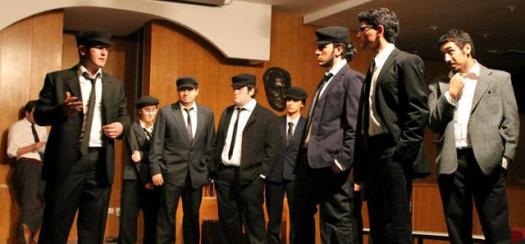Once Upon a Time, and a Very Good Time... Review of "The Salvation of Stephen Dedalus"
James Joyce's classic novel "A Portrait of the Artist as a Young Man" has been brought to the stage by the Department of English Language and Literature. "The Salvation of Stephen Dedalus," a play written and directed by Assoc. Prof. Don Randall, reworks Joyce's coming-of-age story about a young artist's growth, highlighting the conflicts between the protagonist and the society in which he is raised.
Dr. Randall's adaptation concisely captures the narrative and successfully condenses the action into a self-contained play. The production does not rely on theatrical techniques, such as physical props and stage sets, to breathe life into the content. The power and beauty of Joyce's language are well reflected. But in some parts, this reviewer found herself willing the actors to play with the language a bit more: to enjoy the words.
The interesting cross-dressing portrayal of some characters brings an avant garde flavor to the play. Most of the schoolboy roles are played by young women. In addition, while the title character Stephen, played by Berat Melih Kalender, remains the same, several of the other cast members switch between roles. This is sometimes confusing, as transformations come quickly, and it is often unclear who's who. The play successfully captures the Catholic fear of eternal torment. During a "retreat" at Stephen's school, the Rector, played by Don Randall, lectures to the boys about hell; his depictions are extremely vivid to Stephen, who is affected deeply. Throughout the play, James Joyce (played by Patrick Hart) and Stephen connect in dream-like moments, bringing an extraordinary atmosphere to the play.
The cast members are energetic, and there are some genuinely funny moments. But sometimes when actors switch between roles, their tone of voice does not change, resulting in one-dimensional portrayals. On the other hand, one of the productions's strengths is that the actors do not resort to shouting every line for dramatic impact; instead they connect to the text and evoke meaning from the words.
Overall, it was a very interesting experience for me, as one who has recently read Joyce's novel, to watch this innovative portrayal of Stephen Dedalus. The dramatic presentation of his experiences and consciousness invites the reader -- now the playgoer -- into an intimacy with his story. The students and faculty members who have undertaken to produce this play deserve congratulations for their dedication and commitment.
BY Bengisu Yalçın (ELIT/IV)
